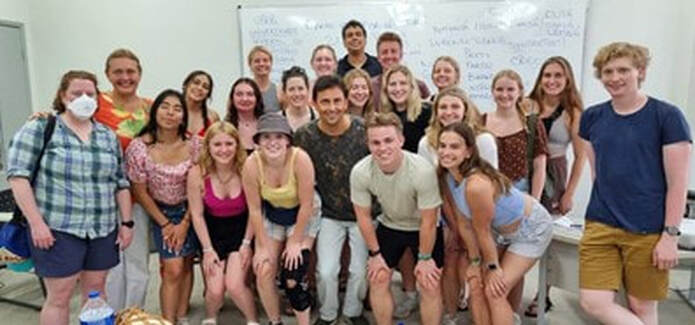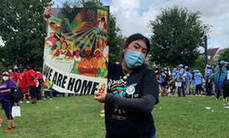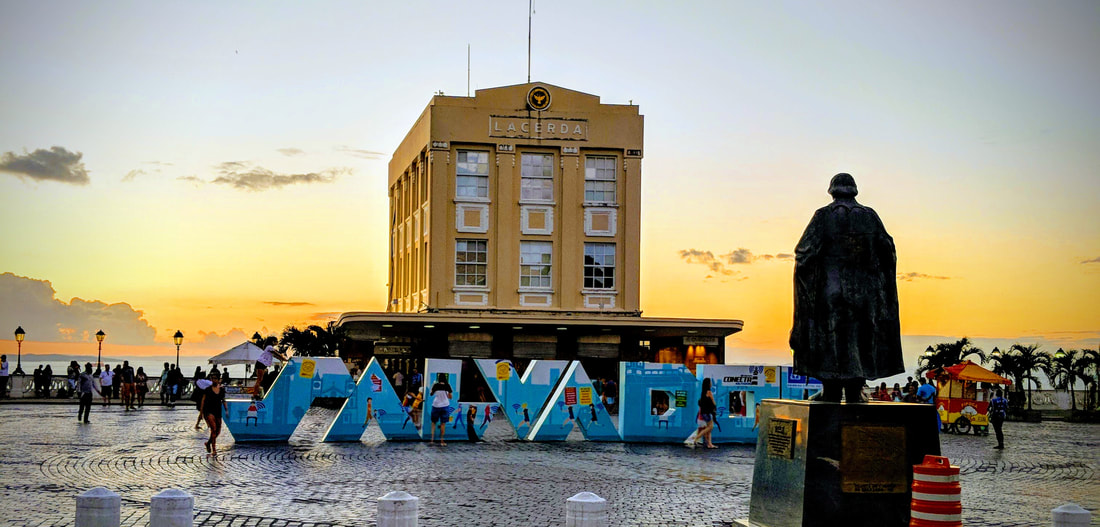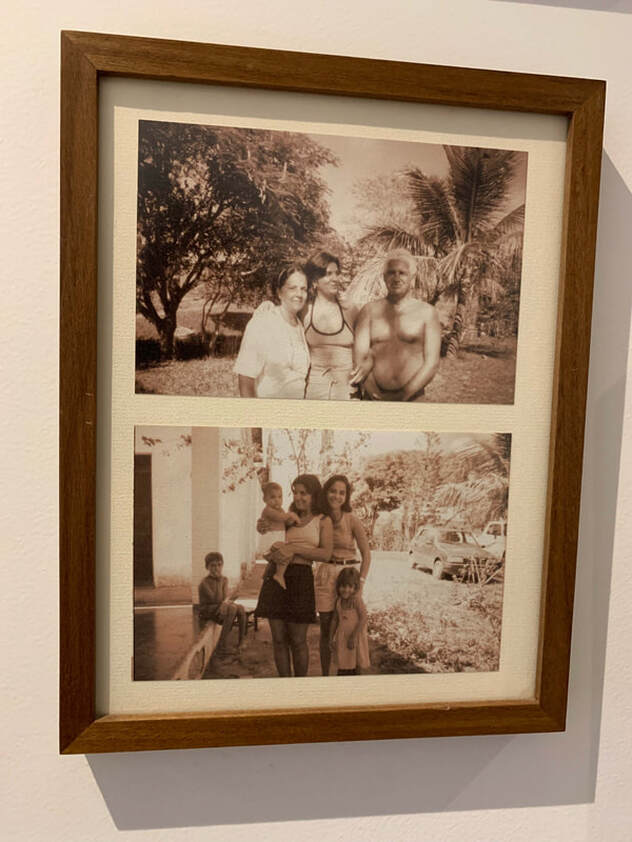|
By Betty Garcia Herrera In the introduction of learning the systemic structure of Brazil, it definitely caught me by surprise. It was quite easy to have read about all the difficulties Brazilians face socially, and economically in our short CD mod class, but to have the ability to view it clear as day definitely brought more clarity. Never had I imagined there was this much of a wide gap to the lack of representation in such a diverse country, learn about the struggles individuals/organizers face in developing more projects, and creating this atmosphere of cultural appreciation towards the various ethnic groups in Brazil. Nations will continue to exist (and some will remain very powerful) but global culture industries will also continue to fragment, differentiate, and deterritorialize (Larrin 2000). In a sense this made me reflect on the living conditions my parents experienced in adjusting to a new country and their difficulties for equality, and how I was able to relate to these organizers in their struggles of trying to show more cultural appreciation in their environment. It’s quite difficult being limited to resources to have the chance to flourish, and expected to work twice as hard to receive half of what others achieve, but that’s just the reality many of us with darker skin complexion, and ethnic features face.  Gaining the opportunity to live with a host family has continued to open my horizon into learning first hand their personal up comings. My host mother is of a darker complexion, and has continued to strive her hardest to provide the best education for her daughters. Racism was very much a part of this intraclass struggle. In spite of traditional discourse in Brazil about “racial democracy,” the darkest Brazilians have the least education, live in the most precarious housing, hold the worst jobs, get the lowest pay (even for the same jobs as lighter Brazilians), die youngest, and hold very few elected posts or high positions in business, government, or the military (Caipora Women’s Group 1993; Fiola 1990). After a few days of adjusting, and getting the preview of the education system in Brazil, I asked my host mother about what process she had set her daughters through. I’ve met one of her daughters, and she’s becoming a doctor. I admire her strength, and will continue to support her on her path. I haven’t met her other daughter as she’s studying in Portugal to become a lawyer. Her daughters both had a private education, but it wasn’t easily done. Apart from living in the city, she has her own jewelry business called Quintal. Going to plug in her instagram, @use_quintal. Her work deserves more appreciation!! I love seeing her passion for this exceed as I shared a few pictures of her work with my friends’ and they instantly purchased her items! She also manages her farm outside of the city. There were a few pictures she showed me, and felt this source of connection between us. I had no great detail about my host family previously coming to Brazil, and all I knew was that she was middle class. I felt it was right to have shared about my background, and how there wasn’t enough unity in my community as it has become highly diverse. As well the background of my parents. My mother has her own land in Guatemala, and as I told her she grew in awe of her. My host mother wishes to one day have the ability to retire on her farm land, and instantly she reminded me of my mother. Side note, I felt this connection that she is exactly like my mother just from another country. I have not once felt homesick as my host mom showed the exact same love I receive from my mother. (Te Amo Mami) Before coming to college, I had faced many difficulties in having the ability to receive higher education. Never did I think college was available for me as my options were very limited. My best, and most stable path was to enter the workforce, and stay there despite all my hardworking time and effort I’ve put into school. I can imagine this falls the same with many kids who have these same circumstances. Blacks are more concentrated in regions where the number of higher education institutions is lower, which may affect the access rates by race/color. (Artes,A.& Ricoldi 2015). Learning about the Instituto Cultural of Steve Biko - Education and affirmative action in Brazil, I was reminded of a program back in my hometown that supported me in the process of the college path, Upward Bound. They provided the resources for us to study for the ACT, and guided us through our choices of which college would be the best fit for us. The Instituto Cultural of Steve Biko provided the resources to prepare students for the ENEM exam, which decides what school is the best fit for the student based on their results, and additionally provide this space for these students to learn more about their ancestry, themselves, and their potential. Honestly I was jealous as this program truly creates the environment for leaders to find their voice and advocate for racial inequality issues. I felt a bit defeated learning about the hardships that Brazil has faced, and what slow economic growth it has received. It had its chance to strive, but unfortunately it just didn’t occur. There is far too much grief from many researchers I’ve heard from in Brazil about its lost potential, but from these hardships all I’ve seen so far is growth. Too often those who have fervently appealed to this grand narrative as Brazil’s past, and its present, also assume that it is Brazil’s future (Van Delden, M. 2001). Bibliography Artes, A., & Ricoldi, A. M. (2015). Acesso de Negros no ensino superior: O que mudou entre 2000 e 2010. Cadernos de Pesquisa. Retrieved May 21, 2022, from https://www.scielo.br/j/cp/a/tttVNfkLTtGXpmB8JDFcdnD/?lang=pt Children on the Streets of the Americas : Globalization, Homelessness and Education in the United States, Brazil, and Cuba, edited by Roslyn Arlin Mickelson, Taylor & Francis Group, 2000. ProQuest Ebook Central, http://ebookcentral.proquest.com/lib/csbsju/detail.action?docID=178419. Jorge Larrain, Identity and Modernity in Latin America (Cambridge: Polity Press, 2000), 170. Van Delden, M. (2001). [Review of the book Identity and Modernity in Latin America]. Modernism/modernity 8(4), 702-703. doi:10.1353/mod.2001.0095. Van Delden, M. (2001). [Review of the book Identity and Modernity in Latin America]. Modernism/modernity 8(4), 702-703. doi:10.1353/mod.2001.0095.  Betty Garcia Herrera is an upcoming sophomore at College of Saint Benedict. She's currently majoring in environmental studies on a pre-engineering track. Her hometown is Worthington, Minnesota. Betty loves being apart of the conversation on social justice issues. During her time in Brazil, she hopes to analyzed more deeply how race and gender are important categories in understanding the country’s struggle for social and economic development.
0 Comments
Leave a Reply. |
Archives
June 2024
Categories
All
|


 RSS Feed
RSS Feed
